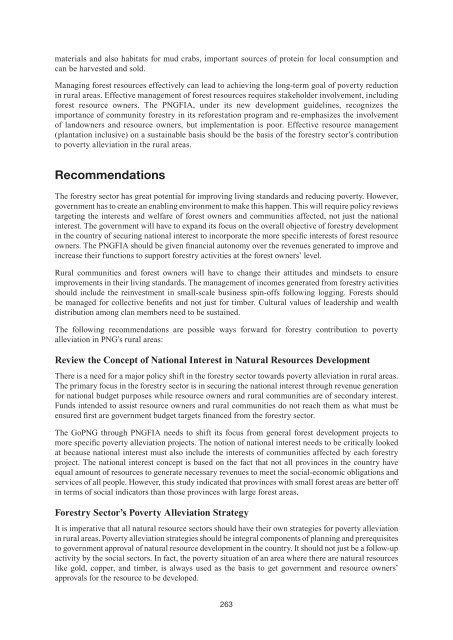Contribution of Forestry to Poverty Alleviation - APFNet
Contribution of Forestry to Poverty Alleviation - APFNet
Contribution of Forestry to Poverty Alleviation - APFNet
You also want an ePaper? Increase the reach of your titles
YUMPU automatically turns print PDFs into web optimized ePapers that Google loves.
materials and also habitats for mud crabs, important sources <strong>of</strong> protein for local consumption and<br />
can be harvested and sold.<br />
Managing forest resources effectively can lead <strong>to</strong> achieving the long-term goal <strong>of</strong> poverty reduction<br />
in rural areas. Effective management <strong>of</strong> forest resources requires stakeholder involvement, including<br />
forest resource owners. The PNGFIA, under its new development guidelines, recognizes the<br />
importance <strong>of</strong> community forestry in its reforestation program and re-emphasizes the involvement<br />
<strong>of</strong> landowners and resource owners, but implementation is poor. Effective resource management<br />
(plantation inclusive) on a sustainable basis should be the basis <strong>of</strong> the forestry sec<strong>to</strong>r’s contribution<br />
<strong>to</strong> poverty alleviation in the rural areas.<br />
Recommendations<br />
The forestry sec<strong>to</strong>r has great potential for improving living standards and reducing poverty. However,<br />
government has <strong>to</strong> create an enabling environment <strong>to</strong> make this happen. This will require policy reviews<br />
targeting the interests and welfare <strong>of</strong> forest owners and communities affected, not just the national<br />
interest. The government will have <strong>to</strong> expand its focus on the overall objective <strong>of</strong> forestry development<br />
in the country <strong>of</strong> securing national interest <strong>to</strong> incorporate the more specific interests <strong>of</strong> forest resource<br />
owners. The PNGFIA should be given financial au<strong>to</strong>nomy over the revenues generated <strong>to</strong> improve and<br />
increase their functions <strong>to</strong> support forestry activities at the forest owners’ level.<br />
Rural communities and forest owners will have <strong>to</strong> change their attitudes and mindsets <strong>to</strong> ensure<br />
improvements in their living standards. The management <strong>of</strong> incomes generated from forestry activities<br />
should include the reinvestment in small-scale business spin-<strong>of</strong>fs following logging. Forests should<br />
be managed for collective benefits and not just for timber. Cultural values <strong>of</strong> leadership and wealth<br />
distribution among clan members need <strong>to</strong> be sustained.<br />
The following recommendations are possible ways forward for forestry contribution <strong>to</strong> poverty<br />
alleviation in PNG’s rural areas:<br />
Review the Concept <strong>of</strong> National Interest in Natural Resources Development<br />
There is a need for a major policy shift in the forestry sec<strong>to</strong>r <strong>to</strong>wards poverty alleviation in rural areas.<br />
The primary focus in the forestry sec<strong>to</strong>r is in securing the national interest through revenue generation<br />
for national budget purposes while resource owners and rural communities are <strong>of</strong> secondary interest.<br />
Funds intended <strong>to</strong> assist resource owners and rural communities do not reach them as what must be<br />
ensured first are government budget targets financed from the forestry sec<strong>to</strong>r.<br />
The GoPNG through PNGFIA needs <strong>to</strong> shift its focus from general forest development projects <strong>to</strong><br />
more specific poverty alleviation projects. The notion <strong>of</strong> national interest needs <strong>to</strong> be critically looked<br />
at because national interest must also include the interests <strong>of</strong> communities affected by each forestry<br />
project. The national interest concept is based on the fact that not all provinces in the country have<br />
equal amount <strong>of</strong> resources <strong>to</strong> generate necessary revenues <strong>to</strong> meet the social-economic obligations and<br />
services <strong>of</strong> all people. However, this study indicated that provinces with small forest areas are better <strong>of</strong>f<br />
in terms <strong>of</strong> social indica<strong>to</strong>rs than those provinces with large forest areas.<br />
<strong>Forestry</strong> Sec<strong>to</strong>r’s <strong>Poverty</strong> <strong>Alleviation</strong> Strategy<br />
It is imperative that all natural resource sec<strong>to</strong>rs should have their own strategies for poverty alleviation<br />
in rural areas. <strong>Poverty</strong> alleviation strategies should be integral components <strong>of</strong> planning and prerequisites<br />
<strong>to</strong> government approval <strong>of</strong> natural resource development in the country. It should not just be a follow-up<br />
activity by the social sec<strong>to</strong>rs. In fact, the poverty situation <strong>of</strong> an area where there are natural resources<br />
like gold, copper, and timber, is always used as the basis <strong>to</strong> get government and resource owners’<br />
approvals for the resource <strong>to</strong> be developed.<br />
263


